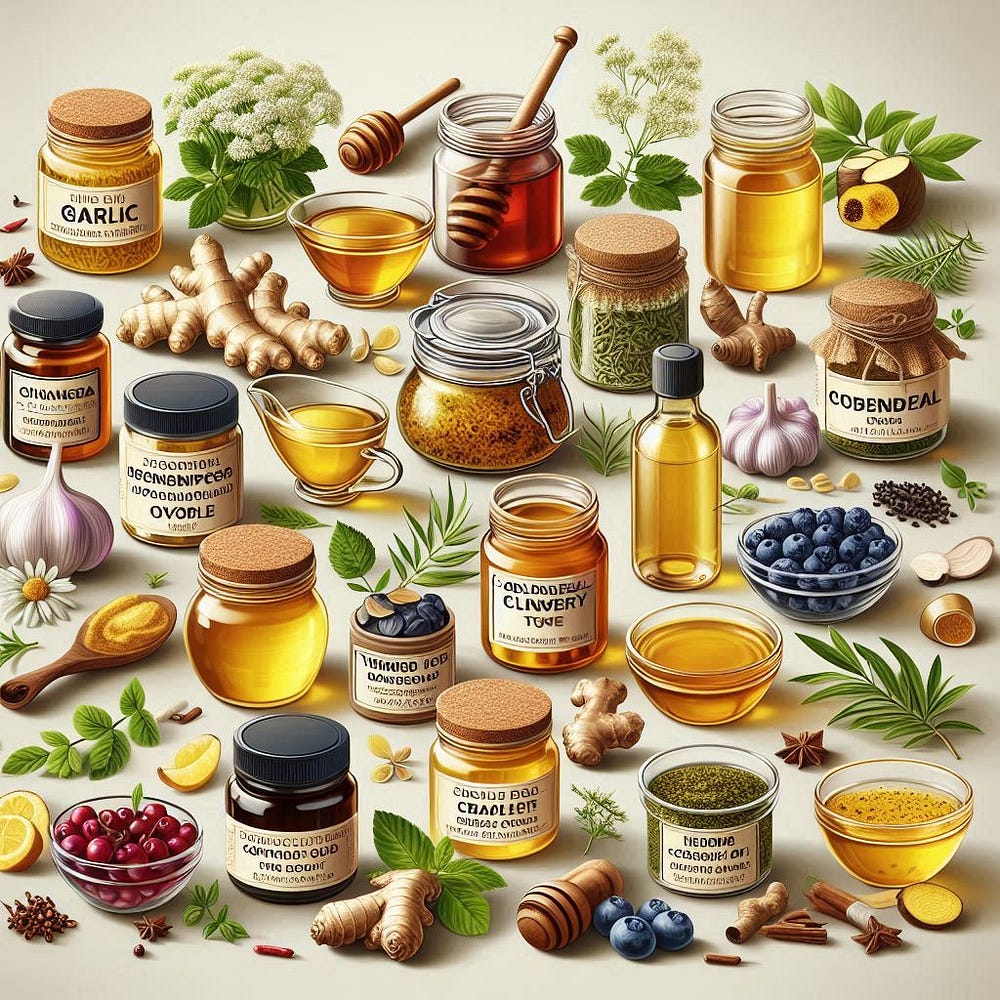Nature’s Medicine Cabinet: The 13 Best Natural Antibiotics Revealed
Unlocking Nature’s Secrets: The Science of 13 Natural Antibiotics

The Science Behind Natural Antibiotics
In the battle against drug-resistant bacteria, the quest for effective antibiotics is more urgent than ever. While synthetic antibiotics remain vital, natural alternatives present exciting supplementary or preventive options. This analysis delves into seven powerful natural antibiotics: garlic, honey, ginger, echinacea, goldenseal, clove, and oregano, along with turmeric, cranberry, coconut oil, olive leaf extract, thyme, and neem. Discover their remarkable efficacy, diverse applications, and potential risks, offering a comprehensive guide for those seeking natural ways to combat infections.
When to Use Prescribed Antibiotics
While natural antibiotics show great promise, prescribed antibiotics are crucial for tackling severe infections. Doctors turn to antibiotics to halt the spread of infectious diseases, prevent conditions from escalating to life-threatening levels, expedite recovery from illnesses or injuries, and avert the emergence of serious complications.
Garlic: A Powerful Ally in Health
Garlic stands as a revered natural remedy across cultures, celebrated not just for its culinary charm but also for its potent medicinal benefits. Extensive scientific research underscores its efficacy against a spectrum of bacteria, including notorious strains like Salmonella and Escherichia coli (E. coli). Remarkably, garlic exhibits promise in combating the challenging multi-drug resistant tuberculosis.
Active Compounds: At the heart of garlic’s antibiotic prowess lies allicin, a sulfur-containing compound known for its robust antimicrobial properties.
Applications: Embraced for both preventive and therapeutic purposes, garlic proves invaluable in averting foodborne illnesses and merits consideration in the treatment arsenal against drug-resistant bacterial infections.
Risks: While beneficial, high concentrations of garlic warrant caution due to potential increased bleeding risks, particularly for individuals on anticoagulant therapy. Furthermore, garlic’s interaction with HIV medications underscores the need for careful management in medical contexts.
Honey: Nature’s Healing Elixir
Honey, revered since ancient times for its medicinal virtues, continues to find its place in modern healthcare practices. Its applications span from treating chronic wounds and burns to managing ulcers, bedsores, and aiding in skin grafts.
Mechanism: The antibacterial properties of honey stem predominantly from hydrogen peroxide. Manuka honey, renowned for its lower hydrogen peroxide content, also exhibits substantial antibacterial activity.
Scientific Evidence: Supported by scientific research, a notable 2011 study showcased honey’s effectiveness against a broad spectrum of bacteria, including the notorious MRSA.
Additional Benefits: Beyond its role as an antibacterial agent, honey fosters optimal wound healing by creating a protective, moist environment conducive to tissue repair.
3. Ginger: Nature’s Antibacterial Wonder
Ginger, recognized by the scientific community as a potent natural antibiotic, boasts impressive efficacy against multiple bacterial strains.
Research Findings: Recent studies, such as one from 2017, solidify ginger’s standing as a formidable antibacterial agent.
Additional Uses: Beyond its antibacterial properties, ginger is gaining attention for its potential to alleviate seasickness, combat nausea, and regulate blood sugar levels.
Active Components: Gingerol, along with other bioactive compounds, underpins its medicinal prowess, contributing to its therapeutic benefits.
4. Echinacea: Ancient Remedy, Modern Marvel
Echinacea, revered by Native American and traditional healers for centuries, continues to intrigue modern researchers seeking to understand its profound efficacy.
Scientific Support: Research published in the Journal of Biomedicine and Biotechnology validates Echinacea purpurea extract’s ability to combat a wide array of bacteria, including Streptococcus pyogenes, implicated in strep throat and necrotizing fasciitis.
Anti-inflammatory Properties: In addition to its antimicrobial effects, echinacea shows promise in reducing inflammation associated with bacterial infections.
Usage: Widely integrated into immune support supplements, echinacea remains a staple in natural health practices.
5. Goldenseal: Nature’s Antibacterial Powerhouse
Goldenseal, traditionally consumed in tea or capsules, is revered for its therapeutic benefits in respiratory and digestive health. Recent studies highlight its expanding role as a potent antibacterial agent.
Applications: Known to combat bacterial diarrhea, urinary tract infections, and skin infections, goldenseal extracts have demonstrated effectiveness even against MRSA in laboratory studies.
Active Compound: Berberine, a prominent component of goldenseal, is celebrated for its antibiotic properties. However, caution is advised as it is not recommended for infants, pregnant, or breastfeeding women due to potential risks.
Caution: Goldenseal interacts with prescription medications, necessitating consultation with a healthcare provider before use to avoid adverse effects.
6. Clove: Beyond Dental Care
Clove, historically used for dental health, is gaining recognition for its broader antibacterial prowess in modern research.
Scientific Findings: Research indicates that clove water extract exhibits effectiveness against a variety of bacteria, including E. coli.
Applications: Besides its traditional use in dental care, clove shows promise in treating various bacterial infections.
Active Ingredients: Eugenol, the primary bioactive compound in clove, is responsible for its potent antibacterial properties, making it a valuable addition to natural health remedies.
7. Oregano: Nature’s Immune Booster
Oregano, celebrated for its immune-enhancing qualities, boasts antioxidant and anti-inflammatory properties, though not all claims have been universally verified. Nonetheless, research underscores its potential as a natural antibiotic.
Research Support: Studies emphasize the efficacy of oregano oil, particularly against bacterial strains.
Applications: Oregano oil is recognized for its role in treating bacterial infections and supporting overall immune function.
Active Compounds: Carvacrol and thymol are key components contributing to oregano’s medicinal benefits.
8. Turmeric: The Golden Antibacterial
Turmeric, renowned for its anti-inflammatory and antibacterial properties, stands out for its health-promoting qualities.
Active Compound: Curcumin, turmeric’s primary active ingredient, exhibits robust antibacterial and anti-inflammatory effects.
Applications: Widely used to address wounds, digestive ailments, and infections, turmeric also bolsters immune resilience.
Research: Scientific investigations affirm curcumin’s efficacy in inhibiting the growth of various bacterial strains, including Staphylococcus aureus and Escherichia coli.
9. Cranberry: UTI Defense Champion
Cranberries are renowned for their efficacy in preventing and treating urinary tract infections (UTIs).
Active Compounds: Proanthocyanidins found in cranberries prevent bacteria from adhering to the urinary tract lining.
Applications: Consumption of cranberry juice or supplements is recommended to ward off UTIs and promote urinary tract health.
Research: Clinical studies have substantiated that cranberries significantly reduce UTI recurrence rates, particularly benefiting women.
10. Coconut Oil: Nature’s Antimicrobial Shield
Coconut oil boasts antimicrobial properties effective against bacteria, viruses, and fungi.
Active Compounds: Lauric acid and monolaurin are pivotal components contributing to its antimicrobial prowess.
Applications: Topical application of coconut oil can treat skin infections, while oral consumption supports overall immune function.
Research: Scientific investigations have demonstrated coconut oil’s ability to inhibit the growth of harmful bacteria like Staphylococcus aureus and Candida albicans.
11. Olive Leaf Extract: Versatile Antimicrobial Solution
Olive leaf extract is renowned for its potent antibacterial, antiviral, and antifungal properties.
Active Compound: Oleuropein, the primary active ingredient, exerts powerful antimicrobial effects.
Applications: Utilize olive leaf extract to combat infections, bolster the immune system, and support cardiovascular health.
Research: Studies highlight oleuropein’s capability to inhibit the growth of diverse pathogens, encompassing bacteria and viruses.
12. Thyme: Nature’s Antibacterial Ally
Thyme is a robust herb celebrated for its significant antibacterial and antifungal attributes.
Active Compounds: Thymol and carvacrol are pivotal in delivering thyme’s potent antimicrobial effects.
Applications: Employ thyme oil for treating respiratory infections, gastrointestinal issues, and skin ailments.
Research: Scientific inquiry underscores thyme oil’s efficacy against bacteria like Staphylococcus aureus and fungi such as Candida albicans.
13. Neem: Ancient Antibacterial Wonder
Neem, steeped in centuries of traditional medicine, boasts broad-spectrum antibacterial properties.
Active Compounds: Azadirachtin and nimbidin play critical roles in neem’s antimicrobial effects.
Applications: Neem finds application in treating skin infections, addressing dental concerns, and combating internal infections.
Research: Studies affirm neem’s effectiveness against bacteria such as Staphylococcus aureus and Escherichia coli, alongside its potential in managing dental plaque.

Understanding Antibiotic Side Effects: Impact on Gut Health and Beyond
Antibiotics, while crucial for treating bacterial infections, can have unintended consequences on the gut and other systems in the body. One of the most common side effects is disruption of the gut microbiota, leading to gastrointestinal issues such as diarrhea, bloating, and abdominal discomfort. This occurs because antibiotics not only target harmful bacteria causing infections but also affect beneficial bacteria essential for digestive health. In addition to gastrointestinal disturbances, antibiotics can sometimes cause allergic reactions, such as rashes or itching, and in more severe cases, they may lead to antibiotic resistance, making future infections harder to treat.
Medical professionals should keep a close eye on their patients while they are taking antibiotics and might want to try probiotics or other supportive measures to lessen these side effects and keep their general health in good shape.
Conclusion
Natural antibiotics such as garlic, honey, ginger, echinacea, goldenseal, clove, oregano, turmeric, cranberry, coconut oil, olive leaf extract, thyme, and neem offer promising supplemental treatments against various bacterial infections. These natural remedies provide beneficial properties that can complement conventional treatments, potentially offering a holistic approach to managing infections in an era of rising drug-resistant bacteria.
However, it is crucial to be aware of the risks associated with natural antibiotics. The concentration of active ingredients can vary among supplements, and some natural products may interfere with medications or cause adverse effects. For instance, high doses of garlic can increase bleeding risk and reduce the efficacy of HIV medications. Goldenseal contains berberine, which is unsafe for certain populations and can interact with medications. Colloidal silver is not recommended due to potential risks, including argyria and interference with antibiotic efficacy.
To ensure safety and efficacy, use natural antibiotics carefully and under professional supervision. These therapies along with established medical practices can boost infection prevention and health.
With warm regards and heartfelt blessings,
Khedija Hafsi.
For more great content, subscribe to my YouTube channel Thanks 🤍🍵
“🌳 Check out my TreeLinks for more helpful content! 🌿”
References
7 best natural antibiotics: Uses, evidence, and effectiveness (medicalnewstoday.com)
Natural Options to Try Before Taking Antibiotics (mercola.com)
15 Natural Antibiotics Provided by Mother Nature (theplantway.com)
9 Natural Antibiotics: Uses, Evidence, Effectiveness (verywellhealth.com)
The Power of Nature: 4 Natural Antibiotics in Your Kitchen | Healthnews

Comments
Post a Comment